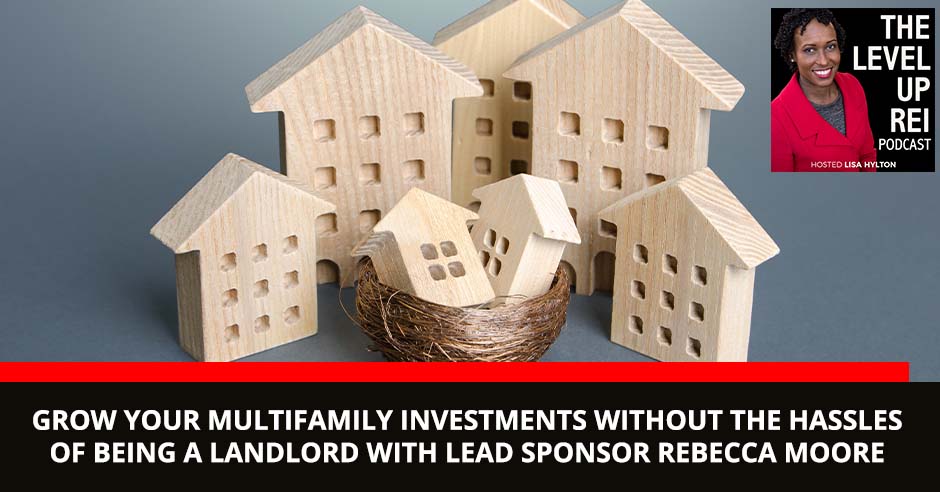
Multifamily assets are a popular investment choice for many reasons. They offer many advantages other commercial real estate property types can’t match. And in today’s episode, Rebecca Moore joins Lisa Hylton. Rebecca is the co-founder of Starboard Equity which helps people invest passively in multifamily real estate syndications to create passive income and achieve financial freedom. Rebecca’s story is one of powerful determination and persistence. Today, she shares how she hired a mentor, learned to underwrite, and built relationships with brokers and investors to help her win and fund deals in Texas while living in California while managing a full-time psychology practice.
—
Watch the episode here
Listen to the podcast here
Grow Your Multifamily Investments Without The Hassles Of Being A Landlord With Lead Sponsor Rebecca Moore
I have on the show Rebecca Moore. She is a Cofounder of Starboard Equity. She has been a real estate investor since 2014 and has syndicated the acquisition of 8 properties over 900 units as a general partner and 2,900 as a limited partner. Her story is one of powerful determination and persistence. She shares how she hired her mentor, learned to underwrite, builds relationships with brokers and investors to help her win and fund deals in Texas while living in California, all while managing a full-time psychology practice.
She is now free from her job and has moved from sunny San Diego to Dallas to commit to the tremendous Dallas-Fort Worth multifamily market and create more investment opportunities. She has created Starboard Equity to help others accelerate their path to financial freedom by investing in multifamily properties.
—
Welcome to the show. I am so happy to have you, Rebecca.
Thank you, Lisa. It is great to be here.
I glossed a little bit about your background. I want to jump right in. Can you talk a little bit about the market that you focus on? It sounds like you focus on DFW, Dallas-Fort Worth, correct?
That is correct. That is where we got our start, and that has been the market I have been working in for a long time. It is very hot over here, not only the weather but the market itself.
Starboard Equity is an active operator in the Dallas-Fort Worth market. Rebecca and her husband, together, actively find deals and manage them to the point at which they are ready to sell and then sell these deals. In this episode, I want to touch on the market of Dallas, why you have chosen that market, and then dive a little bit into multifamily, the trends, your role as an operator, and as passive investors look at the team. The team is super in part important in addition to the market and some of those characteristics about that team. That is where we are going. I am excited to get started on that. To jump right in, we will start to start talking about Dallas as a market. Can you talk a little bit about what makes Dallas markets so hot?
As you presented in the beginning, I was living in San Diego where Warren was a captain in the Navy. Living in California does not have the market that Dallas does. As an investor and a person looking to buy multifamily, the multifamily market there, you are going to pay a premium price and get massive appreciation. The cashflow is very little because you are paying such a high price.
Also, they have their different laws capping the rents, limiting the rents, etc. That is not the case in Dallas. Texas, in general, is not tenant-friendly but more landlord-friendly. What they mean by that is simply if you do not pay your rent, you cannot become a squatter here. That is a great thing as far as your business plan goes. Especially back in 2014, when I first started, the prices were much lower here in the Dallas-Fort Worth or Texas market, in general.
We also know that Texas and Dallas were booming. There are lots of people coming here for jobs, as well as the migration to the South. When you have that mix of great prices and it is a landlord-friendly state, you have the migration of people, the population, and the job growth that DFW had. That makes for a great market to look at. Naturally, you would not want to go to a market where people are leaving the state and leaving that area because there are no jobs. Dallas, Houston, and much of Texas have that going for them.
For someone reading, it is not that California does not have population growth. It does, indeed. However, the price points to purchase multifamily are a lot higher, which is what you touched on. California is known to be a renter-friendly state, and both of those things are going against you when you are getting started and looking for cashflow, hence, the desirability of the Dallas-Fort Worth market.
When you have that mix of great prices and that it's a landlord-friendly state, that you have the migration of people, the population, and the job growth that Dallas-Fort Worth had, that makes for a great market. Share on XPivoting from covering the market into a little bit about the team and the structuring, in my introduction, I talked about you learning to underwrite and the process of purchasing multifamilies while you and your husband were living in San Diego. Can you talk a little bit about your team? I know that most syndication efforts are usually a team sport.
Like many of us who get started in multifamily, we found ourselves a mentor. I would tell everybody that that is a great way to start if you want to become a syndicator, but maybe even passive as well. Find somebody who knows what they are doing and knows how to teach you as well. Our mentor was here in Dallas conveniently so. I started to fly all the time to Dallas to learn the market and how to analyze not only the underwriting but understand and do due diligence on buildings.
Get yourselves into meetups, real estate clubs, and anything that is there in your neighborhood to learn multifamily. That is where you meet the people and your team is built. Myself and another person, Dustin Miles, who was in my same group, partnered together. He is an engineer for Lockheed at the time. He is retired from that at 40. He knew the numbers well and could speak to me about the numbers and talk to me to learn the underwriting.
Together, we started underwriting buildings in Texas. He was their boots on the ground. However, he was also coaching me to be able to talk to the brokers over the phone, insurance people, tax people, lenders, and all the folks that are going to become your greater part of your team. You do not necessarily need to be in that state for them to become part of your team.
When we would get to the point of putting in a letter of intent to purchase a building or if we would get in what’s we call a best and final, where we were going down into the weeds to attack to get the building, I would absolutely fly out to Dallas so I could see it myself, even though I had full trust in Dustin, knowing that he knew what he was doing. Together, that is how I created my team. I showed up at all the investment events, made friendships, and then made the connections that I could over the phone.
Has this been one of your only partnerships or have you then had several other partnerships and teams with other people in your mentorship group?
I have extended to new folks as well because we all have different strengths. One of our many examples is that I have another friend who is excellent at acquisitions. He has a broker and an asset management background for a large commercial real estate company already. He knows what he is doing and he can speak the speak even better than I can.
However, on my side, what is great for him is that I can do some fundraising, and we are great asset managers as well, so we team well together. It’s finding what the strengths are that each of you might bring to the table. Other potential partners or partners that we do have are great at IT. That is very helpful when it comes to marketing or marketing itself. That can be another aspect or branch of that team that can really make things work well together.

Multifamily: I came into the real estate world having some single-family homes we’d accumulated while Warren was in the Navy.
Going deeper into identifying your strengths. It sounded like your last partner already came with a lot of experience in commercial real estate. It was very easy for him to identify what his strengths were, but many people who might be trying to play actively might not necessarily quickly recognize what their strengths are. Was that the case for you? If so, how have you seen other people being able to identify what their strengths are?
As you mentioned in the beginning, I am a psychologist by trade. That is what I was trained for in college, so not a lot in finances. I came into the real estate world having had some single-family homes that we’d accumulated while Warren was in the Navy and understood easy profit and loss from those. You either have a renter or you do not. If you have some expenses, that is how the houses go. It seems like that was much easier.
Beginning as a limited partner, being a passive investor myself, all of my sponsors sent us the full financials. Everybody should look for that when you are going to work with a sponsor on a deal that they should always be monthly sending you all the financials, so you can look at them yourself. That was the first overview of what and how an apartment building works for me that I could see, “Here is where the rents come from. Here is profit and loss.”
Educating myself that way was as an LP. How is this run? How is the money made? That was a great experience, as well as being in my investment group and learning that. Next is the underwriting part. As I wanted to become an active deal sponsor, that is where our partners came in or especially my first partner who taught me how to underwrite. I do not have a financial background. It was intimidating at times because I would be with people who had worked on Wall Street most of their lives or were bankers. They would know how to do that financing and understand and do the numbers all in their head. I can ask you how you feel about the numbers, but I cannot do the calculations they could do right off the top of their head.
I felt intimidated, but we need to be able to overcome that and recognize we all have different strengths and I have been educated. Therefore, I can continue to be educated, go ahead, and open my mind to learn and say, “We all have to start somewhere.” Sometimes that can make us feel bad about ourselves. It can make us feel like, “I do not know enough.” It can build fear.
If we go ahead, persist through that, and make that determined decision, “I am going to learn this,” we can do anything. We are very clear on that about where we are now. I did not know the financials at that time. Now I find that I enjoy that. That is one of the fun things for me when it comes to asset management and budget, but that is where I began. I did not know a lot about the financial part of real estate. That was a big learning curve for me.
The asset management aspect is another area that you play a lot in. What would you say are some of the critical aspects of the asset management operations and how your team goes about navigating them?
I know that you can asset manage from afar because I have done it before. It is critical to be in contact with your management company and have a great rapport with your manager as well. Also, having certain KPIs are the critical points that person needs to be sure they are hitting depending on your business plan. It can vary, but let’s say on a 30,000-foot level, they are hitting the rents that need to be hit to get the income. They are keeping the expenses low and you are able to get your NOI, so your operating income is where you want it to be.
A great way to start if you want to become a syndicator, but maybe even passive as well, is to find somebody who knows what they're doing and how to teach you. Share on XThat is on a big level. Being here in Dallas has been even more fun for Warren, my husband, and I to be able to asset manage because we can be here with our management team and have constant eyes on our apartment buildings. One great story is that Warren was a captain of ships, so he knew the ship itself. Not only is he running it and helping lead the people, but he knows his ship. There are so many folks out there, the plumbers, the electricians, the handy workers, the people who like to take apart stuff and put it back together again.
Many people are so well-informed and ready to be able to take on asset management. Do not be afraid, is what I am saying. Warren has a great knowledge of the air conditioning and plumbing system, and as far as the construction goes itself, that can translate. The story goes as we have one building here in DFW. When we first bought the property, we knew it needed a new hot water boiler. This is for 109 doors, so it is a large boiler. We put out the money for that. Two years later, we got a call from the manager and said, “The boiler is not working anymore.”
I had two plumbers come out, and they said, “We need a new one.” Warren thought, “I am not so sure about that. I am getting in the car and I am coming over.” We went on over there. Warren called the person who installed the boiler, and luckily, they had a rapport with each other already. He sent his person out naturally on a Friday night, and it was a $700 fix. You got to asset manage. You got to manage your manager because the sweet lady did not know. She got two professionals who might have wanted to sell us a new water heater.
If we did not know, we would not know, but Warren was able to put his eyes on it and say, “I do not think so. This is brand new.” That is one story on how it is great to have that boots on the ground. I am not saying you have to, but it is something that you might want to consider when you are putting together your team and/or your limited partner who is assessing the team that they want to invest with. Who is going to be there for us?
That leads me nicely as people are thinking about investing passively and looking at these teams. What would you say are some of the characteristics of a really good operating team?
You can always go back to their track record. Asking those folks naturally, “How many times have you sponsored before?” When I say sponsored, that is being a general partner. That is being the lead, “Are you the lead in this syndication?” Finding out, have they gone full cycle? Have they turned a building from purchase to sale? That is usually very helpful, not necessarily always the end-all-be-all, but it is very helpful.
You can also ask them what the returns have been to their investors thus far. As for ourselves, we have had double-digit returns from our early investments. That has been great to show and help people understand what we do. That is not always we are going into a new economy. That has been our history, so knowing what their history is. Second of all, what is the diversification of the team? It can be very useful if you have someone like myself who knows how to underwrite and acquire the buildings like we have Warren. Somebody who knows how to lead and is quite a great leader, as well as he knows the construction and can lead any construction teams that we might have on the property. He is also very good with lawyers and legal. He is meticulous.
Also, I am in syndication, where I am working with two folks who have been on Wall Street for most of their careers. That is very useful as well. As I mentioned before, IT people who can do the computer work can understand the marketing and get that. That is a nice diversification that I have found that has been very helpful as a team, as a whole, to keep our syndication and our business running very well, even after the acquisition. Those are some things that you can look for. It is not 100%. Some people might be good as general contractors themselves, but thinking of the diversification of the people who are on the team.

Multifamily: We all have different strengths, and I have been educated. Therefore, I can continue to be educated and go ahead and open my mind to learn that we all have to start somewhere.
I also like when I see repeat team members playing together. You and your husband have been married many years. When you guys go off to do a project together, there are less variables when it comes to working together, whereas when you are working together with someone for the very first time, there is also the aspect of you just getting to know them. There is nothing wrong with that, but I think as you are investing, it is important to think about that as well as you are getting ready to invest. What are your thoughts on that? People have to start from somewhere.
They do have to start from somewhere. You are right. That is also where Warren and I like to give back. For example, on this newest acquisition, we are helping a newer team get more experience. They already had two buildings, but we came to this building with them, which is in a fantastic area in Dallas. We knew that they had the right business plan. We have known them for years, but they are still getting their feet underneath them. It is a big boost to have somebody who has almost a decade’s worth of experience. It is a new team, but I am helping this team to even advance more.
I have known them for years. Go past the first opening of the book and see what is on the pages because there might be more than just a new team. I have known these people. I love them. We just have not worked together, and this is a big boost for them, especially the asset management. I will definitely be helping them because they are friends that also live in California. Here in Dallas, I am an asset to them. I want to be able to help them.
They are already great where they are, but maybe I can help them. That is part of the giving back that many syndicators have to help them get going again. Not that these people need it, but you get what I mean. It is building them up to become even better syndicators than before, and maybe we will work together again. I also see your point of view, “Are they jumping around? What is the reason for the jumping around?”
Getting a good understanding of the different teams and them working together is very important as well. What would you say is changing or not changing about the multifamily space that investors need to think about as they think about continuing to invest?
Many things, but let’s think about potentially the recession and inflation. That is a big change that many people have concerns about. I think that inflation will inhibit some folks from getting their own home sooner rather than later. Although that does benefit the owner of an apartment building, in a way, it helps us understand that asset for investment is going to remain stable. People are going to be pulling back the purse strings but staying in their place. That is good as far as an investment goes.
Also, apartments are a hedge against inflation. You have a hard asset. It is not the stock market. Therefore, you know that you are getting appreciation for the real estate itself as well as our job as syndicators is to increase the NOI. It’s because multifamily is not based on a single-family home where it is based on comps, but it is based on the business and the cashflow. There will be income that it brings in. Therefore, we are making it a better place, not only for those folks who live there but also for the investors to be able to have a good investment return.
If your money is in a bank account, it is not making anything. It is definitely going to appreciate along with the building and the business itself. Therefore, you are not losing money that would be sitting in savings. It is here. Although there might not be the tremendous growth that we have seen over the past years, it is still a very viable investment and a good one.
Real estate is unlike the stock market, where you could lose everything on your crypto. You still have a building. It has value, and there are things that you can do with it. So, it feels very stable. Share on XTouching on appreciation, one of the big topics is whether the single-family home space will experience a decrease in home prices. As many people seek to potentially wait out, and hopefully, the prices will go down as interest rates continue to go up, a lot of people will think, “These multifamily prices probably are going to go down too.” What are your thoughts regarding seeing a decrease in prices in the multifamily space and seeking appreciation and higher values to sell assets in the future?
I do not think that the price of the multifamily is necessarily going to have a tremendous downturn at all. I think that they will continue to remain stable again, based on the fact that this is a business, not a single-family home. Also, with the cap rates, they could be stabilizing somewhat, not necessarily going up. There is still very much a buyer’s market that has been occurring. People are still buying multifamily and will continue to because there is that demand for renters. I think it is going to remain stable for the short-term.
That’s one of the key things investors need to think about in terms of the difference between single-family and multifamily in terms of prices. Single-family prices are typically influenced by other single-family homes in that particular area that have recently sold, whereas the value of the multifamily is not necessarily based on other multifamilies that have sold in that area. It is based on the NOI of that asset.
As you touched on earlier, if you are able to increase that NOI, then that is what enables you to have a more valuable asset over time. That increase in NOI is not only due to you increasing rents, but it could also be into you having a better way of managing expenses. That way, you can also have a better NOI at the end of the day. Some of those things are also important for people to think about based on what you said. This now leads me nicely into some of the other questions that I want to pivot into. These are more personal and I touched on them before we started recording, but to kick things off, which is not as personal. Why do you invest in real estate?
We know that it is something tangible. We like to be able to touch what we are investing in. I do have a little bit of crypto, and it is so nebulous to me. Having this stable thing is something that we understand pretty well because many of us starting out lived in apartments. Our parents might have lived in apartments and maybe bought a house. We might have lived in an apartment, and some people bought a house. We get it. You pay your rent and that is how they make their income. It is to understand now.
Coming from California, I understand how massive appreciation can be. That can be great, so we know that it is going to go up. When it comes to real estate, it is not like the stock market where I could lose everything on my crypto. I still have a building. It has value and not going to go zero. That helps too that I can do with it. It feels very stable in that sense as well. Knowing that I run it even back with our single-family homes, being able to take care of it and get the right renter in there, we have that bit of control, and that feels good.
There are multiple ways to make income because it will never go to nothing like a stock. We are in control, not necessarily another company. That is where syndications are great for people to get into because you have contact with your syndicator. You can call them and say, “How’s my building doing?” You are going to get the reports and the financials. It is not like you are going to be calling Apple. Those are some of the points where it is easy to understand, easy to know that you are not going to necessarily lose money unless it is 2008. That is not going to happen and not in multifamily either.
This question leads me nicely to my next one, which is do you invest outside of syndications? It sounds like you do some single-family homes or your own portfolios. It sounds like you also do a little bit of crypto. What is your official answer for outside of syndications? Do you invest in other things outside of syndications?

Multifamily: Having somebody with almost a decade of experience is a big boost, but I’m helping this team even advance.
Yes, but at a much smaller degree. Although Warren and I started out with some single-family homes, we only own one. It is paid off, and we have had the same renter since we got it. That is not usual, but the other rentals that we had, we went ahead and sold those and then invested in multifamily because it is economies of scale.
What I mean by that is that if we have a renter that leaves and we have to go in and fix up the one house and then we have to re-rent it, we wiped out our profits for that year. It does not make sense that when you have an apartment building if one person or two people move out, you are still making money and getting dividends.
What does retirement mean to you at this stage in your journey?
We came in with this idea of, “I want to be free. I do not ever want to work again beyond the beaches of the Caribbean.” Wouldn’t that be great? What are you going to do? I challenged myself, even recognizing that I am still young, and I enjoy this. That is where the giving back helps, helping those folks who also want to syndicate. Let’s get back to the absolute question.
Retirement for me is to be free from somebody else telling me what to do. Warren moved from one side of the country to the next. I was able to work in psychology in the military. It has been a beautiful thing once we were able to be limited partners a few times and rollover. Back in ‘14 and ‘15, the properties were moving fast, so we were able to accumulate some wealth, which was excellent. That allowed me, after getting my first syndication, to go ahead and switch from working for somebody else to working for myself. That was a level of freedom, which was very nice, where I could say I am going to work or I am not. That is huge right there.
Having a number of syndications, as well as I continue to passively invest with my friends, I give them money too, so I can have that passive income. I do keep a very small handful of people in psychology because I love what I do. That might be different than some folks who despise what they do. I am lucky that I love that, and I want to continue to give to people. In psychology, it is always self-reflection. I learned more from my patients. Sometimes, I feel like I teach them, but it is constantly learning about humans, feelings, and the other person’s experience. That is a beautiful thing I do not need to get rid of because I do not have the grind anymore.
I could do that for the rest of my life if I wanted to because it is not a grind. It seems like the idea of us all wanting to retire and never work again is because it is a grind. It stinks. This is doing what you love. Fast forward to having all of these buildings and being able to be an asset manager, my job, for the most part, is being on Zoom calls with my managers talking about what needs to be fixed, how the rents are going, and what is happening with the tenants. That is much more fun for me to interact with them.
It is not a grind. It does not feel like a job. It does not feel like I am doing something that I do not want to do. That is more the answer. I no longer have to do what I do not want to do. That is retirement to me. In addition, I get extra money, and I can be with my family, who I love, and I can travel more so of my time. That is a beautiful thing as well.

Multifamily: Apartments are a hedge against inflation.
What would you say this path of entrepreneurship and investing in real estate has taught you about yourself?
We touched on this when first getting into this endeavor. It is a completely new one and opens your mind to learn again. I have PhD in Psychology. I spent years learning, not only in school but writing the dissertation, adding to science, as well as being a supervisee of people who were above me and excellent in the field. I had to do that over again. That was okay because there are great profits, not only monetarily but emotionally as well.
We are all forever students, but it does impact our own narcissism. Not bad narcissism, but that, “Can I do it? Am I good enough? Can I learn about finances? Can I understand lending?” We have to be open to that. For me to not shy away from that, but to say, “I can do this. I can learn.” Many people think about fundraising as sales. They are like, “I cannot sell to anybody.” I think you are not in private syndication. This is an exclusive club of people who have tremendous returns. I am offering such a great way to preserve, increase wealth, and defer taxes. These are things that my parents had no idea about. This is such a gift.
Does it come with some risks? Some, but not when you are investing with me because I am investing my money into it as well. I know when I am running it, I am going to do everything I can to make it a successful investment for me and for you. It is overcoming limiting beliefs in a nutshell. It all depends on what yours are and you are going to find out what they are.
When you say you are going to find out what they are, is that because the process of either investing passively or deciding to take the route of being an entrepreneur and actively investing is going to reveal those limitations that are standing in your way from making the decision?
In both situations, in making the decision in the first place, even as a limited partner, who do I go with? You have to search your soul to find out, “Are these people I can trust? Will I take them to coffee so I can find out more? Will I get myself to ask them the hard questions that I would think I want to ask, but maybe I am too afraid to?” These are self-reflective things you have to get within yourself to find out, “Why am I not asking the hard questions?” If that might be the case.
To become an active deal sponsor or general partner, there are all sorts of things that will come up that many people have many different answers for, meaning you are going to be pressed to take care of people’s investments and your investment. There are going to be things that are unknowns that will come up, such as the example that I gave you.
We had already put over $30,000 into a boiler, and somebody came in and said, “You have to put another $30,000.” That was not in the budget. These are stressful things, knowing that either my building is going to go without hot water in the winter or I have got to do something now. These are intense little things that can come up that are going to put you to the test, or maybe some people will be ready to take it on, face forward, and barrel right into it.

Multifamily: For me, retirement is to be free from somebody else telling me what to do.
Lastly, has your perspectives on the business of real estate investing changed over the years, and how has that impacted your life?
The impact on my life has been phenomenal. I am so blessed that we started and we took that scary risks. Some people are more risk-averse than others. I would even tell you that Warren has less risk aversion than I do because I get scared and I worry. He said, “It is going to be okay. If we lose it, we can make more.” For me, who comes from a very humble background, that is very scary, but being so blessed to be able to say I am going to work for somebody else or not has been a blessing. To be able to have the abundance and for which now I want to give back and teach other people to do the same thing that I have been able to learn has been life-changing for us. It has been great.
Thank you so much for coming on the show. This was so good. You shared so much. I think we covered the market that you are focused on, which is Dallas-Fort-Worth. Your asset class of focus, which is multifamily, why you focus on multifamily, the role that you play as an asset manager, boots on the ground. As well as raising capital, your perspective on the market as it stands in real estate, characteristics of finding a good sponsor team, and so much more. This episode was absolutely amazing. Thank you so much for coming on. If my readers want to learn more about you and reach out to you, where is the best place you can go to learn more?
StarboardEquity.com is our website. You can find us on LinkedIn, either Rebecca Moore or Warren Buller. We are both there. We also have a Starboard Equity Facebook that you can find. Come join the Starboard Equity club, so you can get on our mailing list, find out what we are doing, and be apprised of all of the offerings that might be coming out. We would love to have a phone call.
Thank you so much, Rebecca. It was a pleasure.
Likewise, Lisa, thank you.
Important Links
- Starboard Equity
- Rebecca Moore – LinkedIn
- Warren Buller – LinkedIn
- Starboard Equity – Facebook
About Rebecca Moore
 Rebecca Moore is the Co-Founder of Starboard Equity. She has been a real estate investor since 2014. She has syndicated the acquisition of eight properties with over 900 units as a General Partner and 2900 as an Limited Partner. Rebecca’s story is one of powerful determination and persistence. She shares how she hired a mentor, learned to underwrite, builtrelationshipswith brokers and investors to help her win and fund deals in Texas
Rebecca Moore is the Co-Founder of Starboard Equity. She has been a real estate investor since 2014. She has syndicated the acquisition of eight properties with over 900 units as a General Partner and 2900 as an Limited Partner. Rebecca’s story is one of powerful determination and persistence. She shares how she hired a mentor, learned to underwrite, builtrelationshipswith brokers and investors to help her win and fund deals in Texas
while living in California, all while managing a full-time psychology practice! Now, she is free from her job.
She moved from sunny San Diego to Dallas to commit to the tremendous DFW multifamily market and create more investment opportunities. She created Starboard Equity to help others accelerate their path to financial freedom by investing in Multifamily properties.
Love the show? Subscribe, rate, review, and share!
Join The Level Up REI Podcast Community today:

Recent Comments